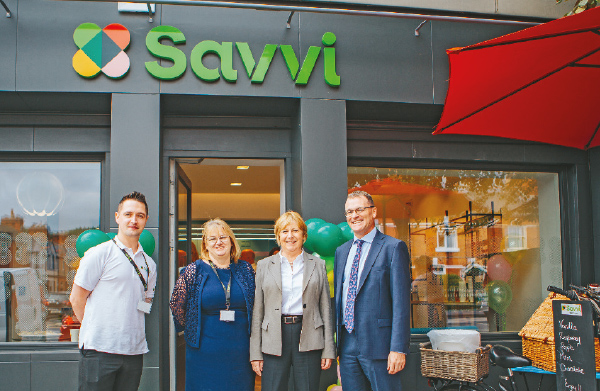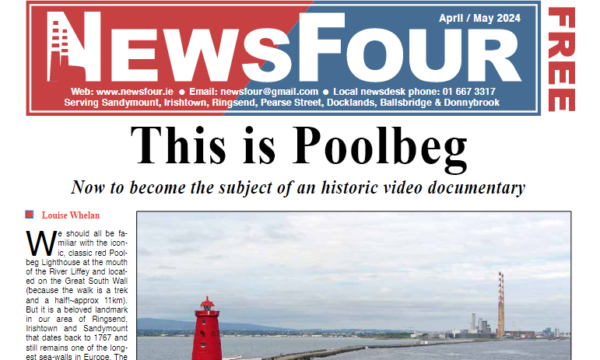By Peter McNamara

CEO Robert Cooper is pictured with staff next to the ice cream trailer at the Savvi Credit Union launch. Picture by Donal Healy. (Courtesy of Savvi Credit Union).
After weeks of building, the revamped Savvi Credit Union has opened in Ringsend. This all-new branch was ushered in with a launch party and ribbon-cutting ceremony.
Members and passers-by alike were treated to freshly scooped ice cream, handmade sandwiches, and hot and cold drinks. Savvi even provided some family entertainment, with a balloon sculptor and storyteller. It made for a nice surprise for many on a balmy Monday afternoon.
The new branch is modern and sleek. The impression one gets upon entering is of vibrant simplicity. The walls are white and clear, the floor is of smooth polished wood and spotlights shine from above.
The simple modern space is embellished here and there by flashes of pleasant colour: There are green counters, blue chairs, and red notice boards – shades taken from the Savvi ‘four-heart’ logo. A digital screen tells the latest bureau de change rates, while customer service staff sit waiting at state-of-the-art desks.
Savvi, which is the re-branded name for the Ringsend & District Credit Union, has been operating in Ringsend since 1969. In his speech at the ribbon-cutting, CEO Robert Cooper thanked members for their patience during the revamp. He also made sure to thank the staff, for putting up with weeks of eating “dust sandwiches.”
“At Savvi we are all about the community,” he said. “And this new branch is proof of our commitment to Ringsend. We are going to be here for some time to come.”
There is a sense of energy and possibility about the place, which is no coincidence. According to Cooper, this latest revamp is part of a campaign of growth and development at the organisation. Along with a new branch, the Savvi Credit Union in Ringsend is also offering a range of new services and initiatives.
“We have big plans for the future,” Cooper tells me. “We want to establish Credit Unions as a meaningful alternative to banks. That’s part of the founding intention of the movement, and we want to make it a reality.”
Credit Unions are linked to the Irish Central Bank, and fall under its regulatory control, a control that has become more pronounced. The link with the Central Bank imposes some limits on who Credit Unions can lend to, but it also offers huge potential for growth and expansion.
Alongside their usual lending and saving services, the Savvi Credit Union in Ringsend is working to offer to their members current accounts, debit cards, online banking, and even mortgages.
“We already give out a few mortgages each year,” explains the CEO, “but we are limited by the Central Bank. We want to expand, to offer even more.” He has great optimism and energy. As we talk, he stops to greet members by name as they come down the street. “In the next year or so,” Cooper adds, “we hope to set up a current account service. People will be able to send their pay cheque directly to their credit union, making it even easier to save with us.”
Credit Unions have a rich history in this country, and they play a vital role in communities across Ireland.
The Irish Credit Union movement was founded in the 1950s through the efforts of three pioneering people, namely Nora Herlihy, a teacher from Ballydesmond; Sean Forde, an employee of Peter Kennedy Bakers; and Séamus P. MacEoin, from Kilkenny, a Civil Servant.
All three worked in Dublin and witnessed the awful effects of high-unemployment and poverty there. People lived in abject conditions, and many were at the mercy of moneylenders. The Credit Union founders saw the scarce availability and poor management of money to be the root of the problem, and they resolved to create some way to enable people to gain more control over their finances.
The first Credit Union opened in Donore Avenue in 1958, and the movement grew and spread from there. The Credit Union Act in 1966 brought statutory recognition of the co-op concept and the common bond at the heart of these organisations.
They are remarkable entities. Credit Unions offer members the chance to have control over their finances by making their own savings work for them. Regular savings form a common pool of money, which in turn provides many benefits for members.
Each credit union is a not-for-profit organisation owned by its members, who both save with, and borrow from it. Members receive a dividend, if declared, on their savings and have access to loans at fair and reasonable rates. And now, with expanding account services, bigger lending limits and online and ATM banking, there has never been a better time to become a member.
The more that Credit Unions can become a ‘meaningful alternative’ to banks, the better it will be. The difference between them and ordinary banks is profound.
Unfortunately, if we have learned anything from the entitled recklessness of the banks during the Celtic Tiger, and the tracker mortgage scandal after the crash, the climate in the banking sector is selfish and aloof, and shows no sign of improving.
By comparison, the Credit Unions genuinely strive to do the best for their members. Their not-for-profit structure sees all profits circulated back into the growth of the business, or given out to members in the form of annual dividends or interest rebates.
The Savvi Credit Union in Ringsend offers its members a funeral allowance, and all debts are cancelled upon death. To imagine a bank cutting your interest rate or cancelling your debt is difficult indeed.
According to Cooper, the Savvi CEO, they’re all about “people helping people.” And he is committed to challenging the dominance of the banks in this market. “We want to compete with the banks in Ireland,” he says, “but their size is their key advantage.” On that side, some Credit Unions in Ireland are joining together, to further empower themselves. “Allied Irish Bank and Bank of Ireland are actually a combination of smaller banks that came together in the 1970s,” he tells me, “so there’s nothing to stop Credit Unions from doing something similar, and levelling the playing field a little.”
Compared with the retail banks, Credit Unions enjoy a great reputation. According to Laura Shilling, the Business Development Manager at Savvi Ringsend, this reputation is now second-to-none.
“As of 2018,” she says, “Credit Unions are the most highly regarded organisations in the State, overtaking An Post in this year’s Reptrak study.” Reptrak, an annual reputational ranking of organisations in Ireland, is run by The Reputations Agency, who gather data from all corners of the country. Kellogg’s came second out of 100 organisations in terms of the public’s trust, admiration and esteem, while Aldi came third. “It’s a great honour,” says Shilling. “And the fact this is a financial institution coming top of the poll really shows you how strongly people feel about Credit Unions.”
There are many companies trying to tap into the goodwill inherent in the organisation. Shilling is often invited as a liaison for the Savvi Credit Union in Ringsend into legal, technology, and communications corporations that operate out of Grand Canal Dock and other nearby locations.
“They bring me in to speak to staff,” she explains, “and once I outline the range of benefits available to members, people are very eager to sign-up.”
Here she touches on a strange lack of awareness among younger people when it comes to Credit Unions. “Older people know all about these organisations and what they can do for you. But it’s like we’ve skipped a generation. Credit Unions are like a best-kept secret. Thankfully the word is starting to spread.”
As we have seen over the last few years, unfettered neo-liberal economics, and the thirst for simple profit, has brought great loss to ordinary families and moved even greater wealth from the many to the few. The mission of community at the heart of Credit Unions and their ethos of ‘people helping people’ is something to support.
Savvi have been a part of Ringsend for some time, and with their sleek new branch they will be for many years to come. Their door is always open to anyone seeking micro-financing. If there’s something you need, or which you’ve been meaning to get sorted, drop into Savvi. They are ready to assist.



